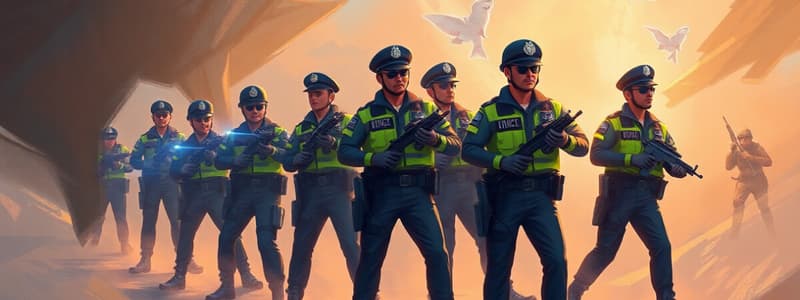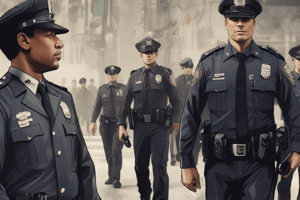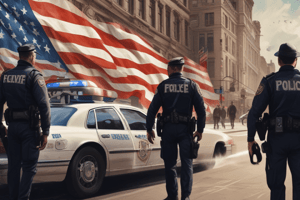Podcast
Questions and Answers
Which principle requires every police officer to play a part in the objectives of the organization?
Which principle requires every police officer to play a part in the objectives of the organization?
- Scalar Principle
- Functional Principle
- Principle of Organizational Efficiency
- Principle of Unity Objectives (correct)
The Principle of Organizational Efficiency requires that a police organization is structured to accomplish objectives with maximum cost.
The Principle of Organizational Efficiency requires that a police organization is structured to accomplish objectives with maximum cost.
False (B)
What does the Scalar Principle emphasize?
What does the Scalar Principle emphasize?
A vertical hierarchy of an organization which defines the flow of authority.
What does the Principle of Authority Level state?
What does the Principle of Authority Level state?
Which style of leadership seeks obedience from the group and involves one-man decision-making?
Which style of leadership seeks obedience from the group and involves one-man decision-making?
In which leadership style does the superior encourage discussion and consultation?
In which leadership style does the superior encourage discussion and consultation?
What are the basic responsibilities of a police supervisor?
What are the basic responsibilities of a police supervisor?
Flashcards are hidden until you start studying
Study Notes
Principles of Police Organization
- Principle of Unity of Objectives - All police officers should contribute to achieving the organization's objectives.
- Principle of Organizational Efficiency - The organization should be structured to accomplish objectives effectively with minimal costs.
- Scalar Principle - A vertical hierarchy defines the chain of command from top to bottom, outlining the flow of authority.
- Unity of Command - Each group of officers should be under the control of one supervisor.
- Span of Control - A supervisor should manage a number of officers they can effectively direct.
- Delegation of Authority - Senior officers delegate some of their administrative power, with corresponding responsibility.
- Functional Principle - Division of work based on type, place, time, and specialization.
- Line and Staff Principle - Different functions are organized into a functional pattern.
- Principle of Balance - Application of organizational principles should be balanced to ensure the patrol force's effectiveness.
- Principle of Absoluteness of Responsibility - Responsibility for performance is absolute and unconditional, and cannot be escaped.
- Principle of Flexibility - The PNP should be adaptable to fulfill its purpose.
- Principle of Authority Level (Hierarchy of Authority) - Decisions within the authority of station commanders should be made by them, not referred to superiors.
- Principle of Parity and Responsibility - The responsibility of a section head for the actions of their subordinates should be commensurate with their delegated authority.
Police Leadership and Supervision
- Police Supervisor - Sets performance goals and deadlines in line with organizational plans and vision.
- Basic Responsibilities of a Police Supervisor
- Direction - provide guidance
- Creation of a Suitable Working Climate - Foster a positive work environment.
- Employee Development - Support the professional growth of subordinates
- Self-Development - Continuous improvement of the supervisor's own skills and abilities.
- Police Leadership - Influencing individuals to work harmoniously towards a shared goal.
- The Process of Leadership-
- influencing individuals to willingly achieve organizational goals.
- The Five Leadership Styles
- Autocratic - The leader holds full responsibility and seeks obedience from subordinates, making all decisions unilaterally.
- Democratic - The leader involves the group in decision-making, seeking ideas and suggestions.
- Free-Rein or Laissez-faire - The leader provides minimal control and interferes very little.
Studying That Suits You
Use AI to generate personalized quizzes and flashcards to suit your learning preferences.




